Christian+Gertrude and earlier
Introduction
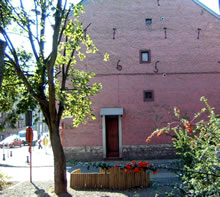 Christian and Gertrude's first home at 1 Rue de la Paroisse, Verviers, Belgium. Their first son Theodore was born here in 1865
Christian and Gertrude's first home at 1 Rue de la Paroisse, Verviers, Belgium. Their first son Theodore was born here in 1865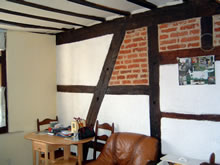
The first Tenten in the tree (so far) is Peter, a farmer, who married Anna Margret Stommel. That's all we know of them except that they had a son, Jean Tenten, who was born in 1802 in Hevinghausen and died 3 June 1855 in Seifen, Much.
Jean married Anna Elisabetha Euer, 14 July 1829; their son Christian Tenten was born in Much, Siegburg, Cologne, Germany 18 Oct 1838 - this is Christian's birth certificate (in German).
Christian was a tailor. He married Gertrude Loop in Verviers, Belgium in 1864 - here is their marriage certificate (in French). He was living at Pont de Sommerlville, she in Rue de l'Abbatoir. Gertrude was born at 1087 Bendelstrasse, Aachen in 1838 and was the daughter of Peter Loop - a needle sharpener - and Anna Maria Bindels, both of Aachen - this is Gertrude's birth certificate (in German).
They moved into the house at 1 Rue de la Paroisse, Verviers, Belgium and Theodore arrived the following year, 1865 - Theodore's birth certificate (in French).
The Travelling Tentens
Christian and Gertrude moved house frequently. When Karolina (Caroline) arrived in 1870 they were in France, when their next child Henry (Grandad) arrived in 1872 they were in back in Bonn, Germany. Maria Margaret was born in 1873 in Germany. The last child of theirs that we know of, Auguste, was also born in Germany, in 1878.
The whole family is next recorded in the 1881 census (with surname mis-transcribed as 'Fenton') at 15 Church Row, Camden, London. By 1891 they had moved to 29 Carnaby Street (what a good place for a tailor), but by then all the children except Auguste had left to marry.
By the 1901 census they had moved again to 76 Marylebone Lane, London - they had George Neuhsinger (age 1), born in Bavaria the previous year, and a lodger Milkman staying with them. George was the brother of Henry John Neuhsinger
At the 1911 census, poor Gertrude was a patient at Hanwell Insane Asylum, Norwood. She was 72, presumably suffering dementia. She died there on 29 March 1915.
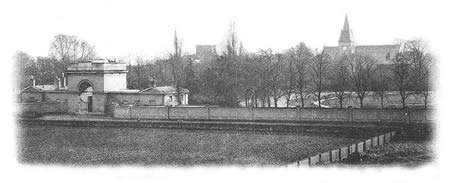
Hanwell Insane Asylum
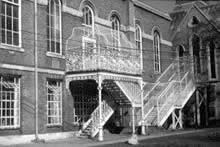
Hanwell Asylum (St Bernard's Hospital)
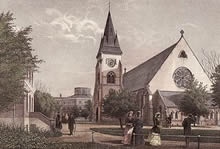
Hanwell Asylum, The Chapel - c. 1875
At the 1911 Census, Christian was living alone at 31 Upper Charlton Street, Marylebone (off the Euston Road). He died aged 74 on 11 March 1913 at 31 Maple Street, just off Tottenham Court Road - according to Betty's notes, I assume she took that from his death certificate..
Why did they come to England?
This is a good question, and I don't yet know the answer. Why did they keep moving around Europe even before they came here? A number of their ancestors were from Aachen - that town certainly had some problems:
"In 1801 Aachen became the "chef-lieu du département de la Roer" in Napoléon's First French Empire. In 1815 after the Napoleonic Wars, the Kingdom of Prussia took over and the city became one of its most socially and politically backward centres until the end of the 19th century. By 1880 the population was 80,000. The city suffered extreme overcrowding and deplorable sanitary conditions up to 1875 when the mediæval fortifications were finally abandoned as a limit to building operations and new, less miserable quarters were built towards the eastern part of the city where drainage of waste liquids was easiest."
Mmm, not too appealing. How about Bonn, where Henry was born:
"the town became part of the German Empire in 1871 during the Prussian-led unification of Germany. Bonn was of little relevance in these years."
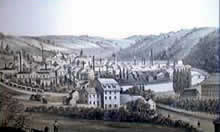 Verviers 1857, View of the east
Verviers 1857, View of the eastSo what about Verviers, Belgium - why did this German-born family come to Verviers to get married and set up home? Were they escaping their parents, escaping something else (persecution? poor prospects? poor sanitation?) or were they just being adventurous, looking for the best opportunities?
So to recap; 1864, both Christian and Gertrude have left Germany and taken up residence in Verviers (at separate addresses, so perhaps they first met in Verviers). They get married, have Theodore, then by 1870 they're in France (somewhere) for Caroline, then back to Bonn, Germany in 1872 for the birth of Henry, and Maria in 1873 - and still there in 1878 for Auguste. Sometime in the next three years, the family moves to London, England - why??
(One other intriguing little piece of this puzzle – granddaughter Catherine Mary is later photographed as a pupil of "All Souls Catholic School". Was the family Catholic at that time? Does this have some bearing on these moves? All very puzzling.)
My best guess so far: I think they were ambitious, had itchy feet, were adventurous. At first, I had trouble reconciling the idea that England would seem sufficiently appealing to overcome concerns about language barriers and all the rest. On reflection, when the Tentens arrived here it was prime 'Industrial Revolution' time. Britain had the Empire, had the best steel industry and had the 'Rag Trade' (important for a tailor) - fed by the cotton mills oop north. I think it is possible that at the time, England looked like the 'land of opportunity', even to a German family, however strange that seems now.
